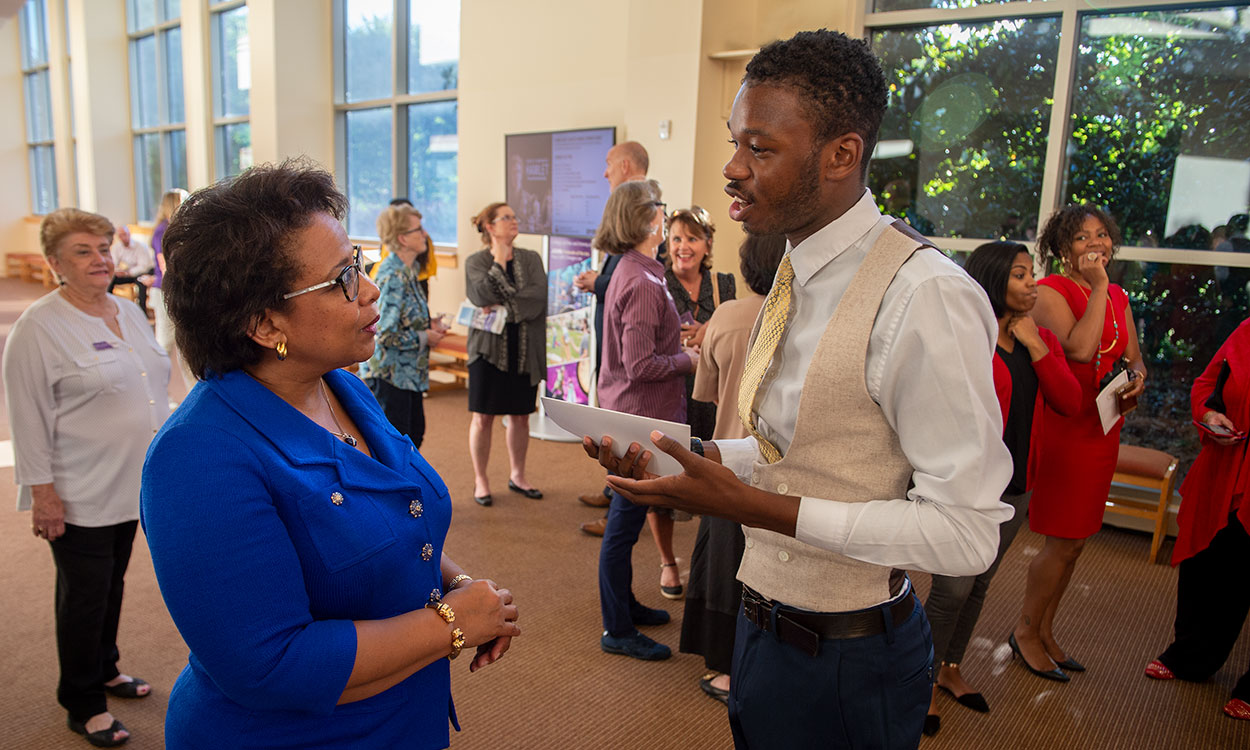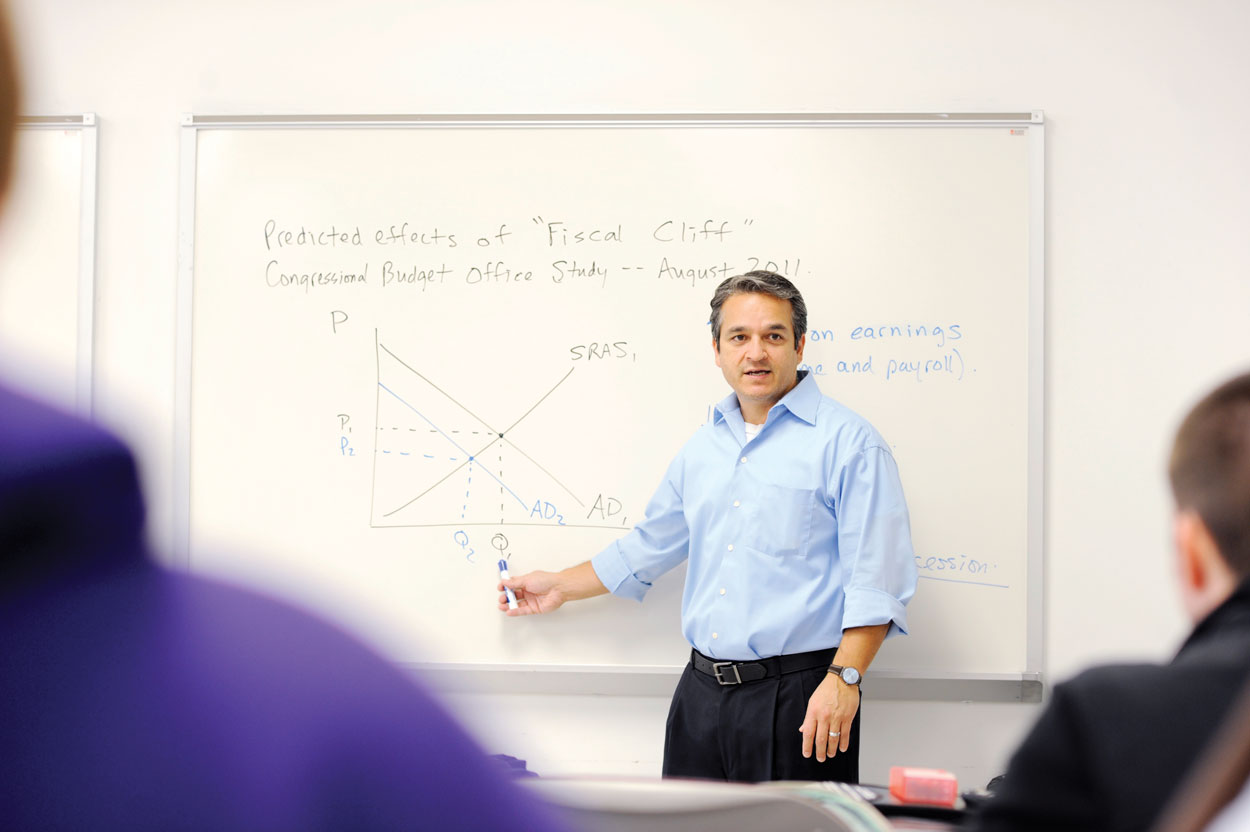Taking The Reins
It was November 1981 when a 23-year-old Kelli McCormack first graced the cover of a magazine. The publication was The Ohio Quarter Horse Association News, and the reason for the prominent placement of her smiling visage was that McCormack had recently won the title of Miss Rodeo Ohio and was in contention for Miss Rodeo America.
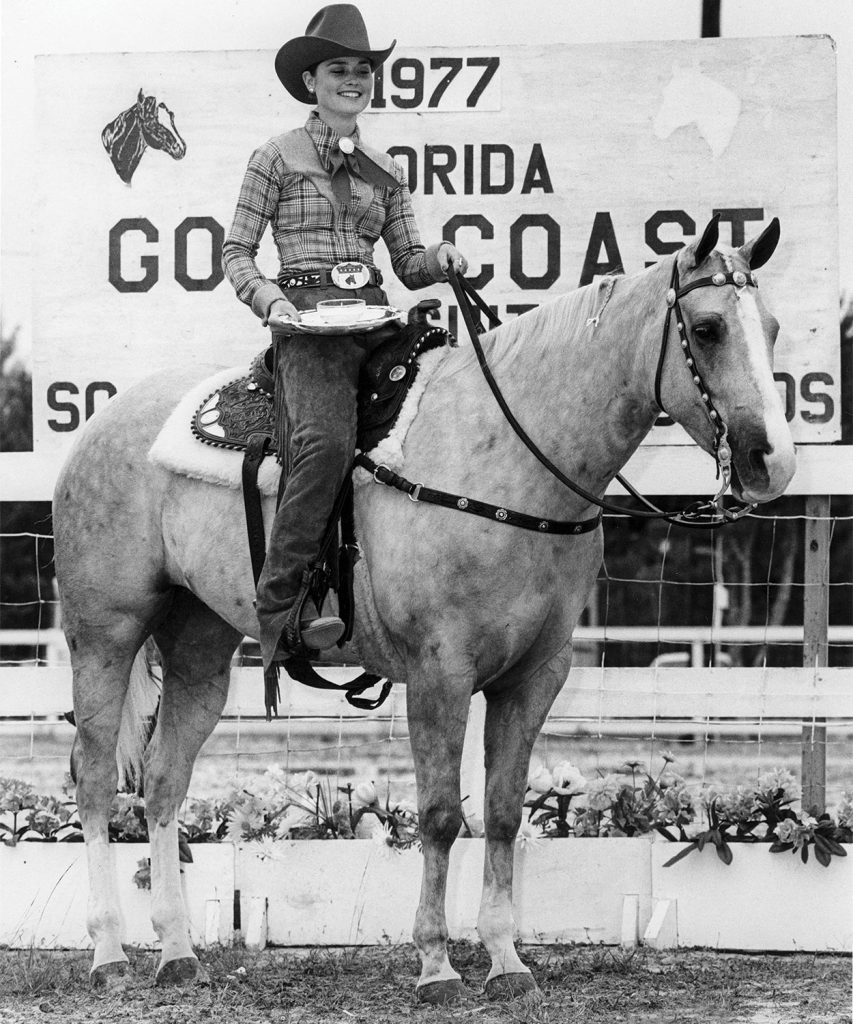 Hit the fast-forward button on the great remote control of life and, nearly 38 years
later, that same woman finds herself once again on the cover of a magazine. This time,
the publication is the one you are reading. And this time, the purpose for her appearance
is that the woman, now known as Kelli R. Brown, has been appointed the 12th chancellor
of Western Carolina University.
Hit the fast-forward button on the great remote control of life and, nearly 38 years
later, that same woman finds herself once again on the cover of a magazine. This time,
the publication is the one you are reading. And this time, the purpose for her appearance
is that the woman, now known as Kelli R. Brown, has been appointed the 12th chancellor
of Western Carolina University.
So yes, it is true — when it comes to finding her face on the cover of a magazine, this is not her first rodeo. (Sorry…we couldn’t resist). And although the latest step in Brown’s 30-plus years in higher education marks the first time she has held an institution’s top leadership position — at least on a permanent basis — she believes that her life and career have positioned her perfectly to step into the role of WCU’s CEO.
Brown was serving as provost and senior vice president for academic affairs at Georgia College & State University when the University of North Carolina Board of Governors elected her as WCU’s next leader on April 25. UNC System Interim President Bill Roper had selected her as his choice for the post after reviewing a slate of three finalists put forward for consideration by a 21-person search committee and endorsed by the WCU Board of Trustees.
Her appointment concluded an unexpectedly lengthy process to find a successor for David O. Belcher, a beloved WCU chancellor who died in June 2018. Brown is the university’s first permanent female chancellor; Alison Morrison-Shetlar, WCU provost, led the university in a transitory capacity for 18 months.
The Wonder Years
Brown was born Aug. 2, 1958, in Orlando, Florida, the eldest of three children of Jim and Charlene McCormack. The family moved north the next year when her father left the U.S. Air Force and took a position with Owens Corp. in Muncie, Indiana, later relocating to company headquarters to Toledo, Ohio.
Growing up in the Midwest, Brown became enchanted with horses — so much so that she asked her parents for a pony for her ninth birthday. She did not get one, so she asked again…and again…and again. Her parents finally granted her annual wish for her 12th birthday. Upon getting a palomino mare named Princess Ginger, she became active in the 4-H youth development organization, where she started showing horses. She turned out to be rather good at it, quickly racking up ribbons, belts, saddles and trophies. Her siblings would soon find themselves saddling up, as well, and the McCormack family spent just about every weekend traveling across the Midwest for horse shows.
“Kelli got into 4-H, started showing horses and, of course, said ‘I’m going to be the best.’ And she was,” said sister March Ferguson, six years younger than Brown (brother Steve is one year younger). “She was always doing something, whether it was DECA in high school, showing horses, on the honor roll or good grades. She was so active in so many things and did them all so well.”
Ferguson would go on to enjoy success in the equestrian world herself, also earning the title of Miss Rodeo Ohio; she and Brown are thought to be the only siblings to share that honor. “It was nice to look up to her and to want to follow in her shoes,” Ferguson said. “She was a very good big sister, and I knew she was already on the road to being successful in whatever she did. I don’t think there was anything my sister didn’t do or couldn’t do.”
While Brown’s success in horse competitions was an integral part of her wonder years, she also credits her experiences in 4-H with helping her develop leadership skills at an early age. “Miss Binnie Masters was my 4-H leader, and she helped instill in me the importance of working hard, taking care of an animal, how to compete and lose gracefully, and being part of a team,” Brown said. “Taking care of a horse or any other animal is a huge responsibility. Being in 4-H helped me grow personally. You may have the best cow, pig or horse, but you may not win the competition that day. This helps build character. I believe it helped build mine.”
Thinking back, her sister also recalls Brown demonstrating the skills of diplomacy and negotiation throughout their childhood. “When my brother and I would fight, she would step in and say, ‘OK guys, let’s just stop and think about this.’ Even when she wanted to scream and go crazy, she was very diplomatic. She could see both sides of every issue and was very analytical in her thinking,” Ferguson said. “She was unusually calm and responsible, even growing up.”
Brown also points to the impact of her late mother as a key factor in her development. “My mother was a special person who worked extremely hard her entire life. She gave up a lot so that we kids could have things. I didn’t realize until I got older how much she sacrificed for us. She was rock solid, always there to celebrate achievements or when we were struggling,” Brown said. “She guided, nudged, encouraged, supported and inspired me to work hard, despite disappointments or setbacks, and I am the woman I am today because of her.”
Next Steps
It should come as no huge surprise that, during those formative years, Brown did not dream of a career in higher education. She wasn’t even planning to go to college; her goal was to marry a cowboy and live on a farm. But her father had bigger aspirations for his three children. He wanted them to seek education beyond high school, in large part because of his experiences growing up during the Great Depression.
“Our dad’s parents had a small restaurant. His mom was a waitress, and my dad grew up there, cleaning tables from the time he was a little kid. They were not considered prosperous at all. My grandfather was a great man, but they struggled financially,” Ferguson said. “My grandfather’s goal in life was for his son to do better than he did, and my dad had the same goal for us — do better than he did. He wanted us to be better off than he ever was.”
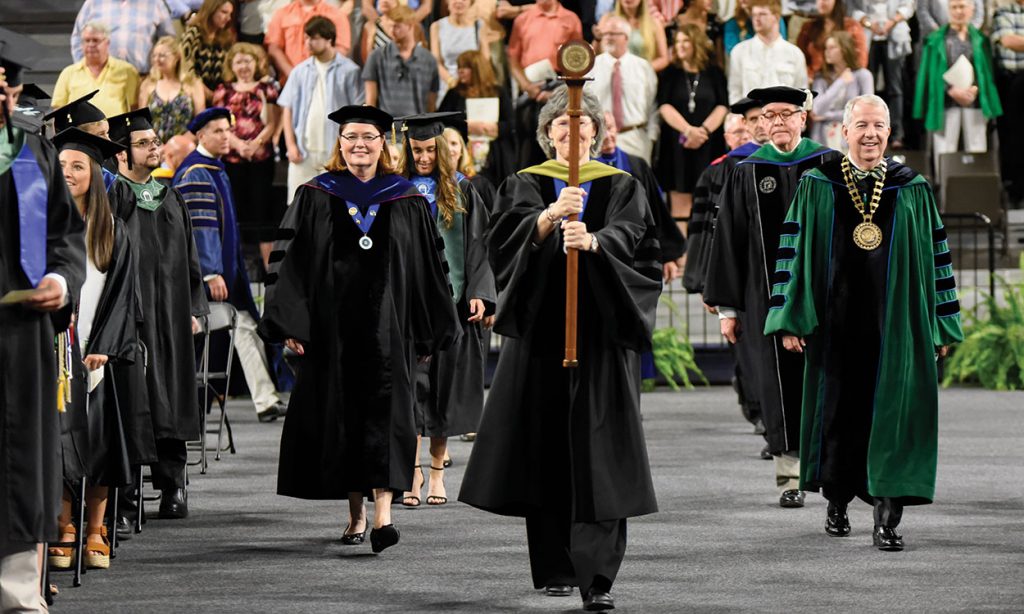
Kelli R. Brown (far left) participates in a commencement ceremony during her tenure as provost at Georgia College & State University, along with Steve Dorman (far right), the institution’s president.
Brown shelved her search for a cowboy and enrolled at Michael J. Owens Technical College, where she worked toward an associate degree in dental hygiene. Ferguson recalls a day when she was late for an appointment to have her teeth cleaned by her sister to help her earn the required number of weekly hours behind the chair. “I got lost on the way, and she said, ‘Do you realize you cost me three hours? You have to come back next week, and I’m cleaning your teeth.’ I thought to myself, ‘My sister is going to be an angry dentist,’” she said.
At her father’s insistence, however, Brown began studying at the University of Toledo while working as a dental hygienist. “My father was the only one in his family to have a college degree. My paternal grandparents completed the eighth grade. My maternal grandparents and my mother graduated from high school. My mother took some classes in college, but she was not a college graduate,” Brown said. “Yet, my parents believed in a college education for all three of their children. They instilled in us there was no other option — you were going to college.”
It was at the University of Toledo where Brown discovered the field of public health. And it was there that she began to gain a true appreciation for the value of higher education and to understand why her father was so adamant that his children go to college. “I firmly believe in higher education,” she said. “I believe that a post-secondary degree is critical for changing the trajectory of a person’s life and, in turn, their family’s lives. It certainly has changed my life.”
After earning her bachelor of science degree at Toledo in 1982, she remained there for graduate school, receiving her master’s degree in 1984. Deciding that higher education would be kicking that dream of marrying a cowboy out of the saddle, she enrolled at Southern Illinois University at Carbondale, earning her doctorate in health education in 1987.
Western Illinois University hired the newly minted Ph.D. as an assistant professor in the Department of Health Sciences, and she would go on to hold faculty appointments at four other institutions — Illinois State University, the University of South Florida, the University of Florida and Georgia College & State University.
Toward the Top Rung
As she began climbing the academic ladder — including the rungs of department chair, associate dean and interim dean — Brown realized that her skill set and experiences aligned with those of senior-level leaders in higher education. So did Steve Dorman, current president of Georgia College. Dorman, also a health educator by training, initially hired Brown as his associate dean in 2007 when he was dean of the College of Health and Human Performance at the University of Florida. Shortly after he became president at Georgia College in 2012, the position of provost opened, and he encouraged Brown to apply. She quickly rose to the top of the pool, said Dorman, who has known Brown professionally for at least 20 years.
Dorman hired Brown as provost and vice president for academic affairs at Georgia College in June 2013. As provost, she led several student success initiatives, including new high-impact practices designed to ensure students graduate on time and the establishment of a national student scholarship office that has helped students win Boren and Marshall awards. She also guided a campuswide program prioritization effort across all units, not just in academic affairs, and steered development of Georgia College’s strategic plan, titled “Our Path to Preeminence.”
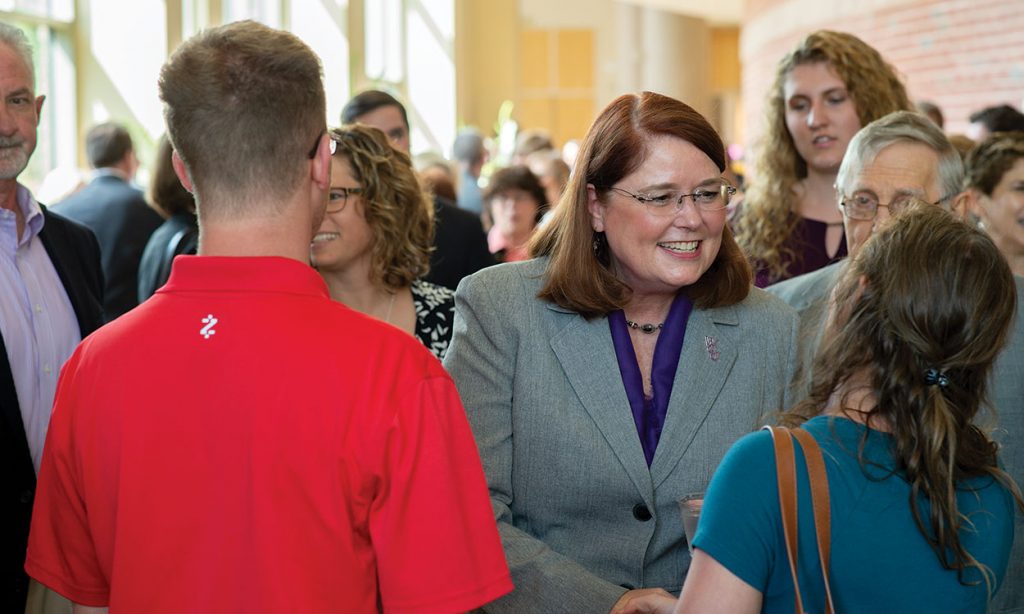
Kelli R. Brown meets with WCU faculty, staff and students following her first address to the campus community in April.
In May 2016, the University System of Georgia asked Brown to temporarily step away from her provost position to serve as interim president of Valdosta State University (like WCU, a regional comprehensive institution) after Cecil Staton left the post to become chancellor at East Carolina University. She returned to Georgia College in January 2017 as provost.
Dorman said he is not surprised Brown was selected for WCU’s chancellorship.
“Kelli is a very outstanding leader. You’re going to find that out very, very quickly. She is a leader who is ready, who is certainly ready to lead an institution. She’s demonstrated that here and she’s demonstrated that elsewhere in the state of Georgia,” he said.
“I think you saw (during the search process) someone who is ready to be a leader and someone who understands higher education and the difficulties that higher ed is encountering right now, but also someone who is very thoughtful and who has an idea of what the future holds for higher ed. I think you saw the competency she projects, the confidence she projects and the passion she projects for higher education,” Dorman said.
It did not take long for news of Brown’s appointment at WCU to spread across the Milledgeville campus. And, as was the case with the college president, that news did not come as a shock. “I remember the day I found out. I had a suspicion,” said Jen Yearwood, special assistant to the vice president of finance and administration. “I knew it was only a matter of time before somebody stole her from us. She is presidential material. I knew when I met her that it was not going to be a long stay here because she’s got bigger and better things that she needs to get done.”
Mark Pelton, Georgia College’s associate vice president for strategic initiatives, characterized Brown as one of the hardest working people he has ever encountered. “It’s not unusual for her to work seven days a week, and I cannot tell you the number of times I have received emails from her on Sunday nights. She is collaborative. She likes to bring the appropriate people to the table to discuss issues and problems and try to find solutions,” Pelton said.
“I think the highest tribute I can give to an administrator is that he or she just wants things to work and to work well. That was the sense I got from Dr. Brown when she came here, that she wanted Georgia College to work and to work well, and that she was willing to help people learn how to work collaboratively and with minimum conflict to achieve the goals of the institution,” he said.
Georgia College staff and students also say they are going to miss Brown. Custodian Eartha Ward admits she was quite nervous when she was first transferred to work in Parks Hall, a main administration building, because “that’s where a lot of higher-ups were.” But Brown quickly put her at ease, Ward said. “One story sticks in my mind more than anything else. One day they had an event next door and she attended. And she came back with a little dessert — I think they call it a scone. She said, ‘You’ve got to try this. It is so good.’ She literally left the building, went back, got in line, got one and brought it back for me to try. I thought that was so special,” Ward said.
Amelia Lord, Student Government Association president, called Brown a “great advocate for women’s leadership” and “a strong female role model.” Lord described her first encounter with Brown, when she was a freshman senator. “I was intimidated going to a meeting with a member of the administration. But she smiled the whole time,” Lord said. “Everyone seemed very important to her. Then after the meeting, I saw that she carried out the things that we had said and had really listened to us. That was really impressive to me.”
A Second First
With Brown on the job in Cullowhee as of July 1, the appointment of WCU’s first female chancellor provides another unique bit of university history. Her husband, Dennis, has become WCU’s first-ever “first gentleman.” It’s the latest in a long line of titles for a man who has done everything from U.S. Army field artilleryman to fast food worker and laborer and from agricultural and test engineer to manufacturing engineer, systems analyst and IT project manager.
“For me, it’s important to be there to support Kelli in her role as chancellor. When we first met and got married 30 years ago, she had an idea of her career path even then, and she was already well on her way in her profession. I said then, ‘I want to support you. I have no problem being the trailing spouse.’ That dynamic has become one of the pillars of our relationship,” he said.“My new formal role as first gentlemen will be interesting. This will be a matter of navigating new territory, both for me and for the university. But, while I may be first gentleman, at the end of the day I’m still Dennis.”
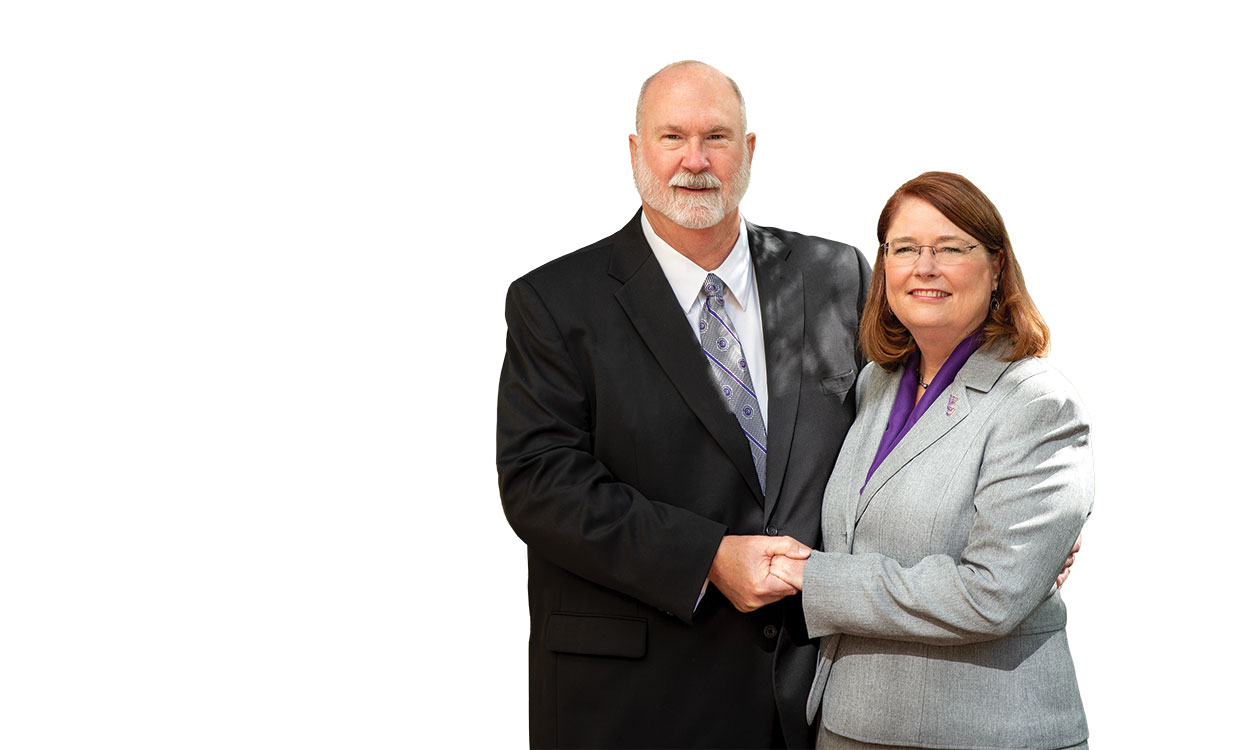 Dennis Brown said he has no plans to seek employment and intends to tackle volunteer
and philanthropic activities he has long been contemplating. His prior military service
has piqued his interest in the Honor Flight organization, which works to transport
veterans to Washington, D.C., to view the war memorials there. He also will strive
to help ensure the improved town-and-gown relationship that blossomed during the Belcher
years continues under the Brown administration. Given his spouse’s career path, professional
accomplishments and pleasant demeanor, he said he anticipates no problems in that
regard.
Dennis Brown said he has no plans to seek employment and intends to tackle volunteer
and philanthropic activities he has long been contemplating. His prior military service
has piqued his interest in the Honor Flight organization, which works to transport
veterans to Washington, D.C., to view the war memorials there. He also will strive
to help ensure the improved town-and-gown relationship that blossomed during the Belcher
years continues under the Brown administration. Given his spouse’s career path, professional
accomplishments and pleasant demeanor, he said he anticipates no problems in that
regard.
“Her honor and integrity always come through at the end of the day. I have been living it and seeing it day to day, year to year, and I know all the challenges she has met and overcome throughout her career. It has been a tremendous experience to be by her side. I think people will quickly recognize her qualities as a leader and will learn to love her and respect her as much as I do,” he said.
The Browns’ former Georgia College colleagues say that sentiment applies to Kelli and Dennis alike. “You guys are getting a team at Western Carolina with the two of them,” said Yearwood. “You couldn’t ask for a better couple because when you hire someone, you’re hiring their other half, too. I have no doubt he’s going to work just as hard as she does at whatever the first gentleman does — and I love that he has that title.” Judy Hatchett, food services supervisor at GCSU, agreed. “They are just very patient and compassionate people,” Hatchett said. “You all are getting jewels, and we’re going to miss them so much.”
And how does family patriarch Jim McCormack feel about the accomplishments of his eldest child? “As her father, I’m very pleased and proud of all her success. I know her mother would be, too,” he said. “Her mother and I knew that in today’s world — even 30 years ago — education opened doors and opportunities we never had growing up.”
That said, McCormack did not expect his fatherly advice would one day lead to a doctorate and a chancellorship for Brown. “One day, she came to me and told me about an opportunity she had been given. She would work as a professor’s assistant and earn her master’s degree. My response was, ‘Well, a little education never hurt anyone.’”
Additional reporting by Melanie Threlkeld McConnell
